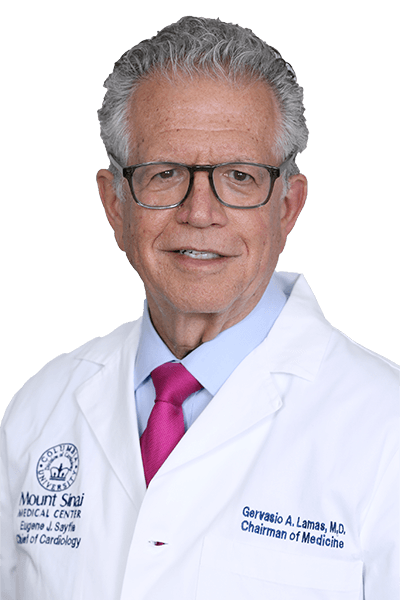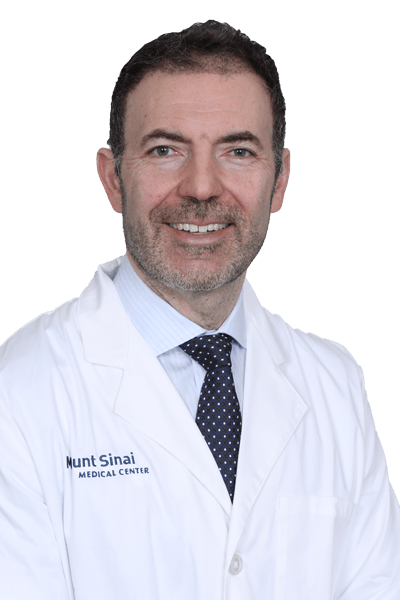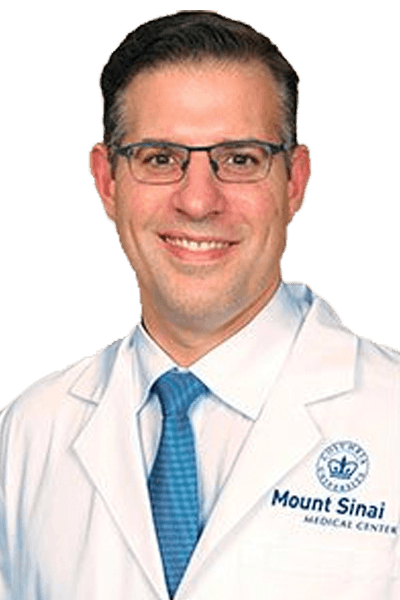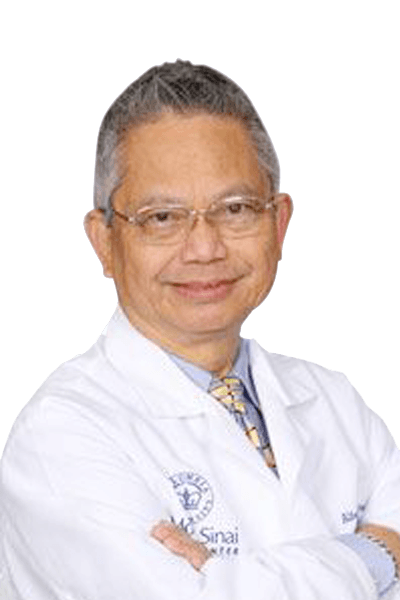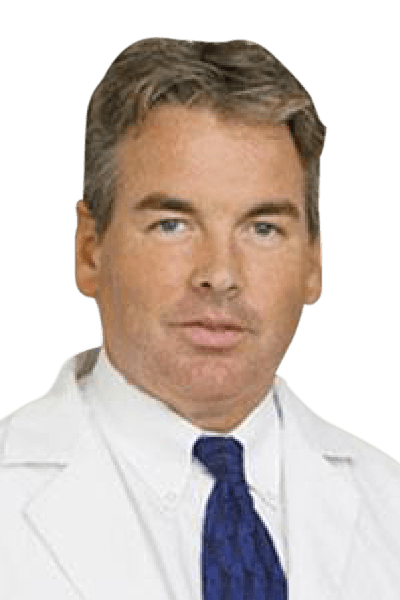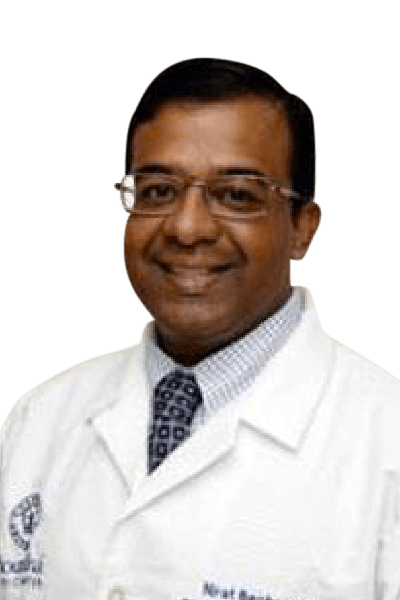Conditions We Treat
The physicians, nurses, and caregivers at the Barry B. Siadat Family Heart Institute diagnose and treat nearly every type of known cardiovascular disease and condition. And patients benefit from the peace of mind in knowing that their specific circumstances will be addressed by the specialist most appropriate for their particular health issue. Our team delivers all patient care with an evidence-based approach, meaning we use proven science to create treatment plans that have been shown to be effective in the following areas of cardiovascular diseases and conditions.
Aneurysms
Aneurysms are bulges – almost like balloons – in blood vessels in the body. We don’t always know the immediate cause of an aneurysm, but in most cases, pressure from inside the blood vessel pushes against the vessel wall, causing it to stretch beyond its normal width.
Aneurysms are a dangerous condition, because they can burst, and the blood from inside the vessel can spill out of the artery. The larger the artery, the more dangerous the aneurysm. In fact, aneurysms inside the aorta, which is the largest artery in the body, or the carotid artery, which carries blood to the brain, can be deadly if they burst.
While aneurysms can occur in many places in your body, the cardiovascular team at the Barry B. Siadat Family Heart Institute addresses aneurysms within the heart and other arteries of the circulatory system. More specifically, we treat the following types of aneurysms, as well as dissections when the artery begins to split open:
- Abdominal Aortic Aneurysm
- Aortic Arch Aneurysm
- Aortic Root Aneurysm
- Ascending Aortic Aneurysm
- Carotid Aneurysm
- Cerebral Aneurysm
- Descending Aortic Aneurysm
- Dissection of Aorta
Artery Disease
Artery disease can include a number of conditions, including aneurysms and dissections; however, the most common form of artery disease is atherosclerosis. This condition happens when cholesterol and other metabolites get stuck inside the arteries. We call the buildup plaque, and it can block blood from flowing freely through the arteries. In some cases of atherosclerosis, the plaque buildup causes the arterial walls to become thick or stiff. This can also prevent blood from flowing well. Mount Sinai’s cardiovascular team works collaboratively to treat artery disease, employing clinical cardiologists who may prescribe a class of medication called statins to help reduce the amount of cholesterol in your blood, which contributes to atherosclerosis. Interventional cardiologists may work with vascular surgeons to use balloons that open up arteries, sometimes also implanting a rigid stent to keep the artery open. And in severe cases, our cardiac surgeons may need to perform surgery to repair or bypass severely blocked arteries. At Mount Sinai, we diagnose and treat the following types of artery disease.- Aortic Stenosis
- Aortic Ulcer
- Aortic Valve Sclerosis
- Atherosclerosis
- Cardiogenic Shock
- Carotid Intimal Thickness
- Carotid Stenosis
- Cholesterol Disorders
- Chronic Total Occlusion
- Coronary Artery Disease
- Intestinal Arterial Insufficiency
- Mesenteric Artery Disease
- Occluded Artery
- Peripheral Arterial Disease
- Pulmonary Embolism
- Renal Artery Disease
- Renal Artery Stenosis
- Spontaneous Coronary Artery Dissection
- Stricture of Artery
Heart Attack
The words heart attack are among the most frightening in all of medicine, because we have so often heard about people who have unexpectedly died from them. While sudden cardiac death is a real and frightening condition, most heart attacks are caused by underlying cardiovascular disease that can be diagnosed and treated to reduce the risk of a catastrophic heart attack.
What is a heart attack? A heart attack occurs when the blood that delivers oxygen to the heart is reduced or completely stopped. When this happens, and little or no blood flows to the heart, the affected area of the heart can be severely damaged, causing heart failure, life-threatening arrhythmias, or even sudden death.
Most of the time when blood flow is cut off and a heart attack happens, it’s caused by a blockage of one or more arteries in the heart. These blockages are often caused by a buildup of plaque or cholesterol deposits or from the formation of a blood clot that forms in the heart – sometimes from plaque that has broken off the wall of a coronary artery – or from a blood clot that travels to the heart from another part of the body.
The Barry B. Siadat Family Heart Institute has trained experts to deal with emergency situations like heart attacks. In addition, patients with chest pain or other symptoms of heart attack can access immediate care at our emergency centers located throughout South Florida. Our physicians can assist with all types of heart attack, including:
- Coronary Artery Spasm or Unstable Angina
- Myocardial Infarction (STEMI & NSTEMI)
Heart Failure & Heart Muscle Conditions
Heart failure means that the heart muscle does not pump blood as well as it should. It does not mean that the heart has stopped or will stop working – it means your heart cannot pump blood as intended. Heart failure, as well as heart muscle conditions, can affect one or both sides of the heart.
One of the most common causes of heart failure is cardiomyopathy, where the heart muscle becomes weaker and less flexible. For patients with cardiomyopathy, their weaker heart muscles can mean poor blood flow, especially to the limbs. When the blood becomes congested in the vessels of the arms and legs, it can collect in peoples’ ankles and feet. This is known as congestive heart failure.
At Mount Sinai, our clinical cardiologists may prescribe blood thinners, as well as beta-blockers and calcium channel-blockers, to prevent the type of blood congestion associated with cardiomyopathy. In addition, we apply a number of interventions to prevent heart failure or to help improve heart muscle function for a number of related conditions, including the following:
- Advanced Heart Failure
- Alcoholic Cardiomyopathy
- Cardiac Insufficiency
- Cardiomyopathy
- Cardiorenal Syndrome
- Congestive Heart Failure
- Cor Pulmonale
- Coronary Artery Disease
- Coronary Calcification
- Coronary Occlusion
- Edema
- Giant Cell Myocarditis
- Myocardial Infarction (Heart Attack)
- Myocarditis
- Pulmonary Edema
- Valvular Heart Disease
Heart Valve Diseases
Valves in the heart work like doors or checkpoints, opening and closing to allow blood to flow in one direction from one chamber of the heart to another. When these valves become diseased, or if someone has a defective valve from birth, they can have symptoms, including a backflow of blood in the heart. While your Mount Sinai cardiologist cannot repair a valve disorder with drugs alone, she or he can use medication to control symptoms and sometimes prevent dangerous cardiac episodes. For patients whose valve disorder cannot be helped with medication alone, surgery or other more invasive procedures may be necessary.
Heart valve diseases can be caused by previous diseases, like Rheumatic Fever, Lupus or Fabry Disease, infection, damage from a heart attack, high blood pressure, or radiation therapy to the chest area.
Generally, there are three types of heart valve problems that we treat at Mount Sinai: regurgitation, where blood flows or leaks backward instead of flowing ahead into the next chamber; stenosis, where the valve doesn’t open completely because it has grown thick or stiff, or gets stuck on nearby tissue; and atresia, where the valve has no opening. At Mount Sinai, we treat the following specific valve conditions:
- Aortic Regurgitation
- Aortic Stenosis
- Aortic Valve Disorders
- Atrioventricular Block
- Bacterial Endocarditis
- Bicuspid Aortic Valve
- Congenital Heart Disease
- Enlarged Heart
- Mitral Regurgitation
- Mitral Stenosis
- Mitral Valve Disease
- Mitral Valve Disease
- Pulmonary Valve Disorders
- Pulmonary Valve Stenosis
- Rheumatic Heart Disease
- Tricuspid Regurgitation
- Valvular Heart Disease
Heart Rhythm Disorders
Heart rhythm disorders are primarily treated under the umbrella of Barry B. Siadat Family Heart Institute’s electrophysiology program.
Normally, the heart beats at a steady rhythm to supply oxygenated blood to the body. For some people, though, their hearts beat irregularly. We refer to heart rhythm disorders like this as an arrhythmia. Their hearts can beat too slowly (bradycardia), too quickly (tachycardia), or too early (premature). When the heart doesn’t beat as it should, normal circulation of the blood can suffer; and when your circulation is irregular, it can cause a wide range of problems, from dizziness and fatigue to stroke and even sudden death.
Cardiac electrophysiology is a branch of cardiology that deals exclusively with the detection and treatment of heart rhythm disorders (arrhythmias), which affect millions of Americans. At Mount Sinai, our team of electrophysiologists works in collaboration with other members of the Barry B. Siadat Family Heart Institute team to treat the following range of heart rhythm disorders:
- Atrial Fibrillation
- Atrial Flutter
- Atrial Tachycardia
- Bradycardia
- Cardiac Arrhythmias
- Heart Murmurs
- Long Q-T Syndrome
- Metabolic Syndrome
- Palpitations
- Supraventricular Tachycardia
- Tachycardia
- Ventricular Fibrillation
- Ventricular Tachycardia
Stroke & Brain Vessel Conditions
A stroke occurs when the blood supply to the brain is interrupted or reduced, which prevents brain tissue from getting nutrients and oxygen. It’s like a heart attack, but in the brain. When strokes happen, brain cells die quickly, which is why prompt treatment is critical.
Other brain disorders can occur when blood flow to the brain is diminished. For example, vascular dementia is caused by reduced blood flow to the brains. This may be caused by the narrowing of the small blood vessels deep inside the brain.
Our multidisciplinary team of cardiovascular experts works in concert with members of Mount Sinai’s department of neurology and neurosurgery and our Comprehensive Stroke Center to treat the following conditions related to brain vessel disorders:
- Cerebral Atherosclerosis
- Cerebral Hemorrhage
- Cerebrovascular Disorders
- Ischemic Stroke
- Stroke
Stuctural & Congenital Heart Disease
Structural and congenital heart disease refers to heart defects that people are born with (congenital). This category of heart conditions also includes injuries that happen to the heart over the course of someone’s lifetime, or “wear and tear” that affects the actual anatomy of the heart.
Valve disorders are among the most common types of structural heart defects. In addition, enlargement of heart chambers and tumors that grow on or around the heart also fit into this category of heart disease. Fortunately, the cardiovascular specialists at the Barry B. Siadat Family Heart Institute are trained to help patients who may have these types of structural heart defects. Our team can provide a variety of interventions to address the symptoms and overall impact associated with the following types of structural and congenital heart defects:
- Adult Congenital Heart Disease
- Aortic Regurgitation
- Aortic Stenosis
- Arteriovenous Malformation
- Atrial Septal Defect (ASD)
- Bicuspid Aortic Valve
- Cardiac Tumor
- Cardiomegaly
- Double Outlet Right Ventricle
- Enlarged Heart
- Marfan’s Syndrome and other Connective Tissue Disorders
- Mitral Regurgitation
- Mitral Stenosis
- Patent Foramen Ovale
- Radiation Heart Disease
- Spontaneous Coronary Artery Dissection
- Thoracic Outlet Syndrome
- Valvular Heart Disease
- Ventricular Septal Defects
- Wolff-Parkinson-White Syndrome
Vein & Vascular Disease
Vein and vascular diseases include a wide range of conditions that affect the network of vessels that carry blood throughout our bodies. Arteries are responsible for bringing oxygenated blood away from the heart to every organ and cell in the human body. Veins, on the other hand, return deoxygenated blood back to the lungs to get a good dose of oxygen.
Vascular diseases refer to any condition with the arteries or veins that affect how blood flows.
The most common type of vascular disease results from deposits of fat that turn into a substance called plaque. These deposits can block blood vessels, making it harder for blood to flow through. In severe cases these deposits can completely block blood vessels, causing dangerous symptoms or catastrophic failure of blood vessels.
Aneurysms can occur when the wall of an artery becomes expanded – like a balloon – and the weakened vessel wall becomes vulnerable to rupture. This can happen in major vessels like the aorta or carotid artery, as well as in vessels within the abdomen, brain, and limbs.
At the Barry B. Siadat Family Heart Institute, our cardiovascular specialists are trained to treat patients with a variety of vein and vascular diseases, including:
- Amyloid Heart Disease
- Atherosclerosis
- Blood Clots & Deep Vein Thrombosis
- Blood Clotting Disorders
- Buerger’s Disease
- Chronic Venous Insufficiency
- Claudication
- Coronary Thrombosis
- High Blood Pressure/Hypertension
- Hypotension
- Mesenteric Vascular Disease
- Peripheral Arterial Disease (PAD)
- Peripheral Vascular Disease (PVD)
- Pulmonary Embolism
- Pulmonary Hypertension
- Raynaud’s Disease
- Renovascular Conditions
- Superior Vena Cava Syndrome
- Thrombophlebitis
- Varicose Veins
- Vasculitis
- Vasospasm
Our Physicians
Gervasio A Lamas, MD
Chairman of Medicine
Eugene J. Sayfie, M.D. Chief of Cardiology
Co-Director, Barry B. Siadat Family Heart Institute
Professor at the Columbia University Division of Cardiology at Mount Sinai Medical Center
- Cardiology
- Concierge Medicine
- Mount Sinai Medical Center (Main Campus)
- 305.674.2998
Eric S. Weiss, MD, MPH
President of Cardiovascular & Thoracic Surgery (CVTS) at Mount Sinai Medical Center
Co-Director of Valve Surgery at Mount Sinai Medical Center
- Cardiology
- Cardiac Surgery
- Thoracic & Cardiovascular Surgery
- Mount Sinai Medical Center (Main Campus)
- 305.674.2780
Steve Xydas, MD
Chief of the Columbia University Division of Cardiac Surgery
Co-Director, Mount Sinai Heart Institute
Co-Director, Aortic Center
- Cardiology
- Cardiac Surgery
- Robotic Surgery
- Aortic Aneurysm Repair
- Minimally Invasive Valve Surgery
- Thoracic & Cardiovascular Surgery
- Mount Sinai Medical Center (Main Campus)
- 305.674.2121
Alfonso O Tolentino, MD
Vice Chairman of Medicine
Director of Electrocardiography Laboratory at the Columbia Division of Cardiology at Mount Sinai Medical Center
Assistant Professor of Medicine at the Columbia University Division of Cardiology at Mount Sinai Medical Center
- Cardiology
- Mount Sinai Medical Center (Main Campus)
- 305.674.2690
Roy F Williams, MD
Chief, Divison of Thoracic Surgery
- Cardiology
- Robotic Surgery
- Thoracic & Cardiovascular Surgery
- Lung Cancer
- Mount Sinai Medical Center (Main Campus)
- 305.674.2121
Nirat Beohar, MD
Director, Cardiac Catheterization Laboratory
Director, Interventional Cardiology Fellowship Program
Medical Director, Structural Heart Disease Program
Professor at the Columbia University Division of Cardiology at Mount Sinai Medical Center
- Interventional Cardiology
- Cardiology
- Mount Sinai Medical Center (Main Campus)
- 305.674.2690


